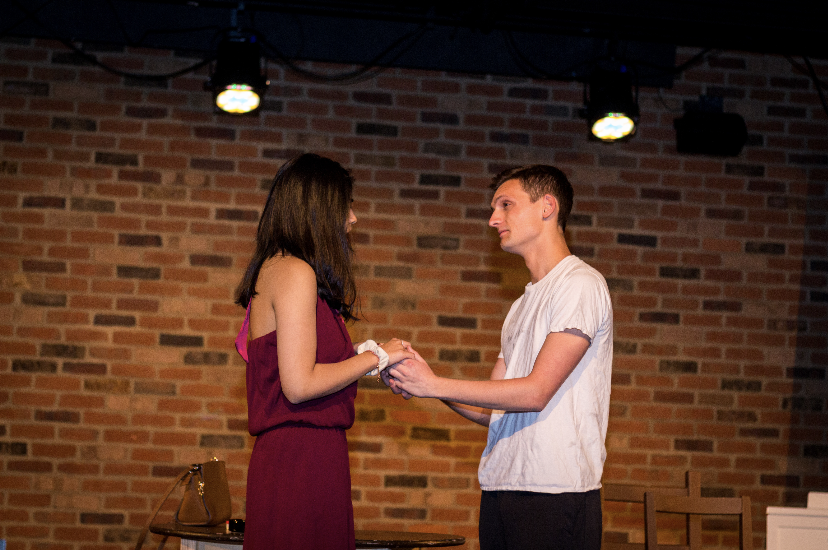
Growing up, my mother always told me a parent should never have to bury her child; a somber adage, yet one that carries particular weight in the lives of those who have. “Parenthood: Short Musings on Birth and Death,” a compilation of four one-act plays, not only examines the theme of the loss of a child, but also grapples with the various afflictions and tribulations that come with being, or trying to become, a parent.
The plays, written by critically acclaimed contemporary playwrights, successfully take on this challenging topic and do so in only an hour and a half. Taylor Mac’s “The Levee” sets the tone, with a couple desperately trying to conceive while burdened with the devastation of miscarriage. In Geoffrey Nauffts’ “Baby Steps,” a gay school teacher is met with disheartening bigotry when trying to adopt a child in the wake of his partner’s death. This is followed by Trista Baldwin’s “Falling Up,” where two co-workers try to discover love after the loss of the man’s son. Finally, the theme of mental health is explored in Michael Griffo’s “Cloudy,” in which the character Georgia retreats into her own imaginary sanctuary after tragedy befalls her three children.
Jack Lattimore ’20 directed and co-produced the performance, drawing inspiration for the production after reading “The Levee” in the anthology “Naked Angels: The Issues Projects.” “Parenthood,” presented at the Hopper Cabaret from April 25 through 27, marks Lattimore’s stellar debut as director. Through a mix of realism and absurdism, he manages to address the myriad perspectives on and repercussions of parenthood with a unique compilation that stands out from most theater at Yale. He reflected on the significance these issues may have on his audience in their not-too-distant future.
“I found these four plays and realized how they interconnected in pregnancy, to miscarriages, all the way to the end, reflecting on death,” Lattimore said. “I felt that’s important in our developmental stage where we’ve come out of childhood. We’re not fully adults yet and we’re kind of in this in-between zone. It’s a really intriguing time to look at this topic of parenthood and grappling with that as we ourselves are approaching our full adulthood.”
The small, yet striking cast of three — Richard Hicks ’18, Samuel Lee ’19 and Ayla Khan ’21 — delivered first-rate performances, taking on the realistic roles as their own while also breathing palpable emotion into their more absurd, delusional characters. Hicks, who laments his impending departure from Yale’s theater community, furnished some levity in his role as Robert, the exceedingly nervous gay school teacher at the adoption agency, in “Baby Steps.” The back-and-forth between Robert and prejudiced Rosemary (Khan) quickly turns from a humorous stepping-on-eggshells conversation to a more matter-of-fact — and personally gratifying — discourse in which Robert defends his right and reason to adopt a child — an effort which proves futile.
Hicks reminisced on his love of theater and the opportunity to finish his Yale theatrical career with “Parenthood.”
“It’s very emotional,” Hicks said. “[Theater] has just been such a huge formative part of my life that it’s rough [that] I’m not going to have that much time for it. … But I love this play, so I wouldn’t have wanted it to be anything else that would be the last one I did.”
The most powerful moments of the performance are its frequent and interspersed emotional nosedives. One such display of despair was masterfully executed by Khan in her role as Paige in “The Levee”; she no sooner finds out she is pregnant than has a miscarriage. Her hope for the future is quickly dashed, as she relinquishes her wish to conceive and cradles her distraught husband, rather than seek medical attention. Lee gives an equally impressive portrayal of Dan, the still-there husband of his mentally unstable wife Georgia. In a nonsensical, yet gleeful conversation between the two, Dan’s joyful countenance is transformed into one of absolute dread, as he realizes his pleas will never fully bring his wife back from the incident.
The actors reflected on the pitfalls of playing such complex characters and how Lattimore’s constructive direction made the show and their performances possible.
“Jack had to tell us again and again that this is a difficult process, because these characters aren’t necessarily thinking normally and they didn’t really make sense,” Khan said. “So I think that was more difficult to do, at least for me. I had to let loose and intuitively act. You couldn’t really step into the head of the character, because you couldn’t understand exactly what it is that they’re going through.”
Although I have no plans on becoming a parent anytime soon, my own role as a soon-to-be aunt brought my viewing of this play and its themes the tangible sense of gravity and pertinence they deserve. Lattimore masterfully combined four different stories to convey, as he put it, “the dynamics of sexuality, of gender expression, of class, of social status and of mental health” within the sphere of parenthood.
Donations collected at the end of the show go to support the following organizations that align with the social issues of the production: Planned Parenthood, You Gotta Believe and the COPE Foundation.
Gaby Mencio | gaby.mencio@yale.edu







